Update: Since we wrote this story in August 2023, the weight-loss drug market has seen rapid developments. There has been much debate about regaining weight after one stops taking the drug. There also has been much speculation about the future availability of these drugs in a much cheaper pill form. But the biggest news is the availability of the weight-loss drug tirzepatide, the same compound used in the sought-after diabetes drug Mounjaro, which will go by the brand name Zepbound. Eli Lilly also announced it will sell Zepbound directly to patients and offer home delivery.
Hollywood has propelled the drug’s popularity. Celebrities such as Amy Schumer, Sharon Osbourne and Chelsea Handler have admitted using it. Some, like Schumer and Osbourne, reported it made them very nauseous. Despite the side effects, Osbourne said she lost 30 pounds. Former U.K. prime minister Boris Johnson stopped taking Ozempic altogether, while Charles Barkley lost 60 pounds by injecting Ozempic competitor Mounjaro.
I can’t help but wonder, ‘Is Ozempic right for me?’”
— Jimmy Kimmel
2023 Academy Awards
12-Mar-23
Noting the many celebrities in attendance at the 2023 Academy Awards who appeared significantly thinner, Jimmy Kimmel joked, “I can’t help but wonder, ‘Is Ozempic right for me?’”
BuzzFeed Reporter Kelsey Weekman observed that Ozempic was all over social media. On TikTok, the hashtag #Ozempic had 72 million views as of May 31, 2023. Offering a counterpoint, TikTok influencer and model Remi Bader said she began binging after she stopped taking Ozempic.
Ozempic is the brand name for a hormone called GLP-1, which stands for glucagon-like peptide-1, and which has been prescribed to treat type 2 diabetes for more than half a decade in the U.S. Here’s a brief history of GLP-1:
- 1964 – The initial discovery of GLP-1 was made by researchers at the Salk Institute in San Diego. They isolated a peptide hormone from pig intestines and named it glucagon-like peptide-1 due to its structural similarity to glucagon, another hormone involved in blood sugar regulation.
- 1987 – The first functional studies on GLP-1 were conducted by researchers who identified its ability to enhance glucose-dependent insulin secretion. They found that GLP-1 stimulated insulin release from pancreatic beta cells when glucose levels were elevated but had no significant effect when glucose levels were low.
- 1990s – Further research revealed that GLP-1 not only stimulated insulin secretion but also inhibited glucagon release, a hormone that raises blood sugar levels. This dual action of GLP-1 on both insulin and glucagon made it an attractive target for diabetes treatment.
- 1996 – The first GLP-1-based drug, exenatide, was developed and approved for treating type 2 diabetes. It is marketed by Amylin Pharmaceuticals in the European Union under the brand name Byetta. Exenatide is a synthetic version of a naturally occurring peptide found in the saliva of the Gila monster, a venomous lizard. It functions as a GLP-1 receptor agonist, mimicking the effects of GLP-1 in the body.
- 2005 – Another GLP-1 receptor agonist, liraglutide, was approved for the treatment of type 2 diabetes. Liraglutide is a modified version of human GLP-1 with an extended half-life, allowing for once-daily dosing. Liraglutide is manufactured and marketed by Novo Nordisk. The drug was approved for treating obesity under the brand name Saxenda.
- 2010s – Several other GLP-1 receptor agonists, including dulaglutide, semaglutide, and albiglutide, were developed and approved for treating type 2 diabetes. These drugs provided additional treatment options for patients unable to achieve adequate glycemic control with traditional therapies.
- December 2017 – Developed by Novo Nordisk, semaglutide, a once-weekly GLP-1 receptor agonist, received approval from the U.S. Food and Drug Administration (FDA) to treat diabetes. Semaglutide is marketed under the brand name Ozempic.
- June 2021 – A higher 2.4mg dosage of Ozempic’s active ingredient, semaglutide, was approved for weight loss in June 2021 and branded as Wegovy. This marked a significant milestone in the use of GLP-1-based therapies beyond diabetes management.
- May 2022 – The FDA approved tirzepatide, which belongs to the same class of drugs — glucagon-like peptide-1 (GLP-1) agonists — as two other FDA-approved semaglutide drugs, Ozempic and Wegovy. Manufacturer Eli Lilly markets tirzepatide under the brand name Mounjaro.
- November 2023 – In a bid to combat obesity, the FDA greenlit Zepbound, a potent rival to Wegovy. Clinical trials show Zepbound aiding patients in shedding 18% of body weight, slightly surpassing Wegovy’s 15%. Both are weekly self-injections with similar side effects. Zepbound’s approval could alleviate Wegovy shortages and benefit millions fighting obesity.
GLP-1 receptor agonists have helped people shed 15% to 20% of their excess weight, the kind of weight loss only possible before with bariatric surgery. The cost of Wegovy before insurance is approximately $1,400 a month, significantly more than Ozempic’s out-of-pocket rate of about $900 a month. Since insurance often does not cover prescriptions for weight loss, some see Ozempic as a more affordable option.
Sensational headlines, like “Weight-loss drugs like Ozempic are treating binge eating, too,” and “Ozempic might help you drink and smoke less,” both published in The Wall Street Journal in the same week, only helped stoke more consumer interest in these new therapies.
But as a New England Journal of Medicine study reports, it could take a long time for meaningful results to show:
”The mean change in body weight from baseline to week 68 was −14.9% in the semaglutide group as compared with −2.4% with placebo, for an estimated treatment difference of −12.4 percentage points.”
— New England Journal of Medicine
18-Mar-21
Unless one has the patience and money for an Ozempic or Wegovy treatment, be forewarned that it could take as much as one year and 14 weeks to achieve a weight loss comparable to what Novo Nordisk mentioned in that Billy Gardell Ozempic ad.
Recent photographs of the “Mike and Molly” actor reveal a remarkable transformation. Gardell says he underwent bariatric surgery to lose 150 pounds and has “also been working to improve his relationship to food.” He didn’t say if that relationship improvement included Ozempic, but since Gardell starred in an Ozempic TV spot and suffered from type 2 diabetes, draw your own conclusions.
While Gardell drew attention to Ozempic in copious television ads in February 2021, the Dr. Oz Show aired a segment that same month entitled, “Could a Diabetes Drug Cure Obesity?” which further helped mainstream the drug.
And that’s the conundrum of the case for GLP-1. Once you are on a medication program, expect to inject yourself for two years or more, if not forever. Yet the treatment is beguiling. Early results for Eli Lilly’s Mounjaro suggest even steeper weight loss. In a phase 3 trial that looked at the efficacy and safety of Mounjaro in people with overweight or obesity who did not have diabetes, participants lost as much as 23% of their body weight.
No wonder, The Wall Street Journal called Mounjaro, the “King Kong of weight-loss drugs.” The only fly in the ointment is cost. The list price of Mounjaro is $1,023.04 per fill, which contains a four-week supply. Without insurance coverage, the drug costs more than $50,000 a year.
Insurance is a major obstacle since many employers’ health plans try to restrict access to pricey drugs like Ozempic and Wegovy. Most plans cover Ozempic as a diabetes treatment, however, fewer than a quarter cover drugs specifically designed for weight loss, according to a survey by the International Foundation of Employee Benefit Plans.
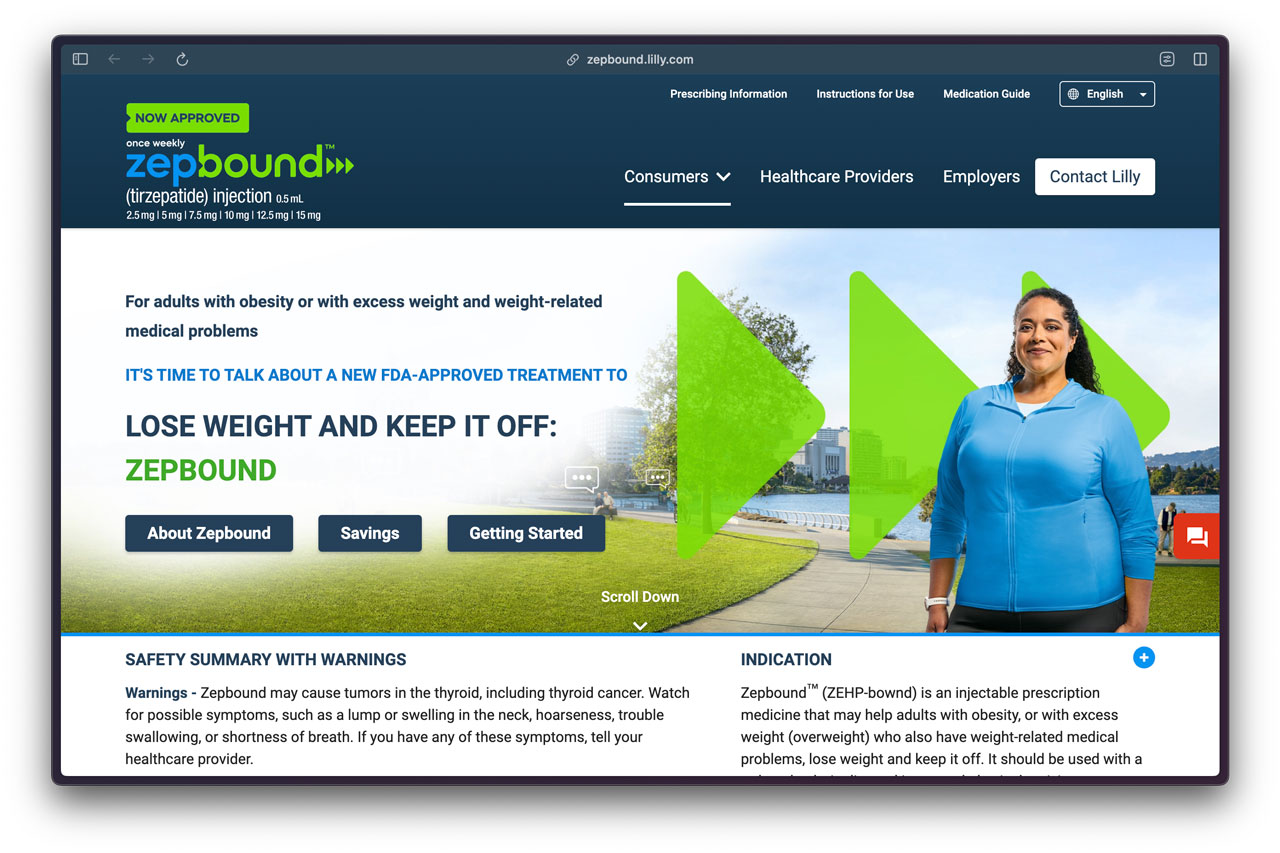
Zepbound & LillyDirect
In November 2023, the FDA approved a new weight-loss medication containing tirzepatide, the active ingredient in the diabetes drug Mounjaro. In a second phase 3 clinical trial, Mounjaro helped people with diabetes lose nearly 16% of their body weight (or an average of 34 pounds) over 18 months, according to manufacturer Eli Lilly.
Zepbound joins a class of new medications that are transforming obesity, a condition that affects 100 million Americans, and will compete directly with the popular obesity drug Wegovy from Novo Nordisk. Like Wegovy, taking Zepbound involves a weekly self-injection. Zepbound operates by slowing stomach emptying and targeting the brain’s appetite regulation. Side effects are similar — mostly gastrointestinal issues such as nausea, with long-term effects still unknown.
In the larger of two randomized, double-blind, placebo-controlled trials of adults without diabetes, those randomized to receive the highest approved dosage of Zepbound (15 mg once weekly) lost, on average, 18% of their body weight compared to those receiving a placebo. That compares favorably with Wegovy, manufactured by Novo Nordisk, which produced an average 15% weight loss.
Eli Lilly is launching a telehealth platform, LillyDirect, that will provide patients with prescriptions for various conditions and offer home delivery for their medicines. LillyDirect will sell its weight-loss drugs, including its newly approved Zepbound, directly to consumers (DTC) and bypass drug distribution middlemen. This precedent-setting DTC move is expected to upend the traditional go-to-market strategy in the drug arena.
Zepbound is expected to be covered by some insurance plans. Medicare and Medicaid do not cover the drug, and if your private insurance doesn’t cover Zepbound, it can cost more than $1,000 per month. However, Lilly says certain commercial card savings programs can reduce the monthly cost of Zepbound to about $550 or lower.
Zepbound represents a significant addition to obesity treatment options, particularly considering its innovative distribution channel.
How Long Does It Last?
The big question looming over all these new weight loss drugs is: what happens when you stop taking the medications?
One recently released study on tirzepatide , the compound in Zepbound and the diabetes drug Mounjaro, led by Dr. Louis Aronne, a professor of clinical medicine at Cornell University, showed that those who continued to take tirzepatide for an additional year lost another 6% of their body weight, while those on a placebo gained 14% of their body weight on average.
By the end of the trial, 90% of those who received tirzepatide for the entire length of the study maintained at least 80% of the weight loss they’d already experienced at the halfway mark. That was true for only 17% of participants who were switched to the placebo shot at the nine-month mark.
Ozempic-Like Pills Are Coming
Drugmakers are working on pill versions of injectable weight loss drugs like Ozempic and Wegovy. Novo Nordisk is furthest along, with a semaglutide pill in late-stage testing. In trials, it helped people lose up to 17.4% of body weight, similar to the injectable. While pills may not lead to quite as much weight loss as the injected versions, they could cost hundreds less per month, appealing to many patients.
The chemistry to make peptide-based drugs like semaglutide into pills is challenging. Companies are using higher doses or non-peptide versions to overcome digestive tract degradation. Side effects of the pills are similar to the injectables, mostly mild/moderate nausea. Some may still prefer the convenience of weekly injections.
Novo Nordisk plans to seek approval for its semaglutide pill in 2024. Other companies like Eli Lilly and Pfizer also have experimental weight loss pills in development. Analysts estimate the global anti-obesity drug market could eventually reach $100 billion. Pills could capture as much as 15% of that market by appealing to the needle-averse and being cheaper.
Matchmaking Services
To help consumers obtain prescriptions, medications and insurance approval, a host of services have cropped up promising weight loss nirvana. Most of these services are startups located in either New York or San Francisco. We decided to throw our hat in the Ozempic ring and checked out the following “matchmaking services,” listed in alphabetical order:
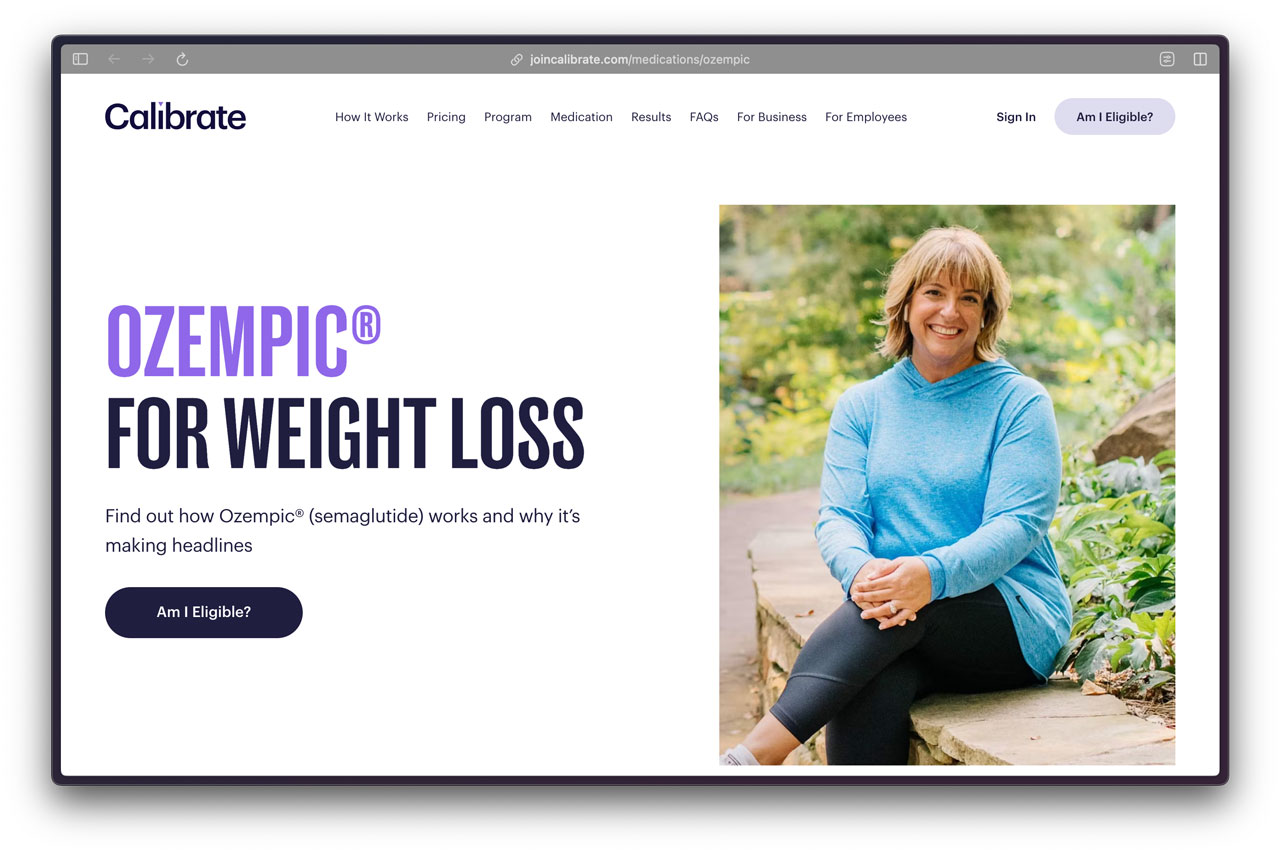
Calibrate
Calibrate was established in June 2020 by Founder and CEO Isabelle Kenyon. In April 2023, Calibrate cut 18% of its workforce, after cutting 24% in July 2022. Since most of these programs offer pretty much identical services, we’ll use the website description of Calibrate, the first company in our listing, as a blueprint for the services offered by most of the other players:
Ozempic is a safe, doctor-prescribed GLP-1 medication. If you’re eligible for Calibrate, you will be considered for all GLP-1s that are clinically appropriate, covered by insurance, and in stock, including Ozempic. We’re the first metabolic approach that addresses your unique biology — not your willpower — and the only program that guarantees 10%+ weight loss or your money back*. Translated: Calibrate actually works.
— Calibrate Health
retrieved 21-Jun-23
*Results Money Back Promise
With Calibrate’s Results Money Back Promise, eligible members qualify for a refund (minus a $250 fee for the initial doctor appointment) if they do not achieve a minimum of 10% weight loss at the end of the Calibrate Metabolic Reset, defined by calculating the percentage change in weight at the start and end of your Metabolic Reset program. For purposes of calculating your weight loss percentage, Calibrate will use your first synched weight following receipt of your Welcome Kit. However, if your weight is substantially different at the time of your first doctor appointment, we will typically use that updated weight instead as your weight at the start of your Metabolic Reset. Any refund will exclude the cost of medication, labs or other items and services charged by third parties.
Calibrate Health Inc.
105 W. 86th St. #514
New York, NY 10024
Program Cost
Starting at $146/mo. or $1,749 upfront (prescriptions not included). Save $100 in June.
Reviews
In less than two years, Calibrate has racked up 490 Better Business Bureau complaints:
”BBB files indicate a Pattern of Complaints regarding order fulfillment, customer service and billing issues for Calibrate Health, Inc. BBB has noted a marked increase in complaint filings against the company since 2022. Consumers claim they register with the company to enroll in a program offering weight-loss prescription medications and telehealth support. A number of consumers allege that once they sign up, they are charged right away (anywhere from $1,000-$1,500) for the annual program. Many of the complainants describe problems encountered in receiving the medications or health support services such as lengthy delays and lack of communication/responsiveness. Other consumers who want to cancel the program/service reportedly experience difficulties trying to get Calibrate Health to take action, whether it is to process a refund or terminate a payment plan that’s been previously set up (like Affirm). Most of the consumers say the company’s inadequate customer service is an obstacle to resolving any issues and others noted that the canned or bot responses the company sends through its support channels are not helpful.”
— Better Business Bureau
retrieved 21-Jun-23
The layoffs starting in July 2022 had a major impact on customer service. Like most of these services, Calibrate has a better Trustpilot rating: 3.1 out of five, based on 448 reviews.
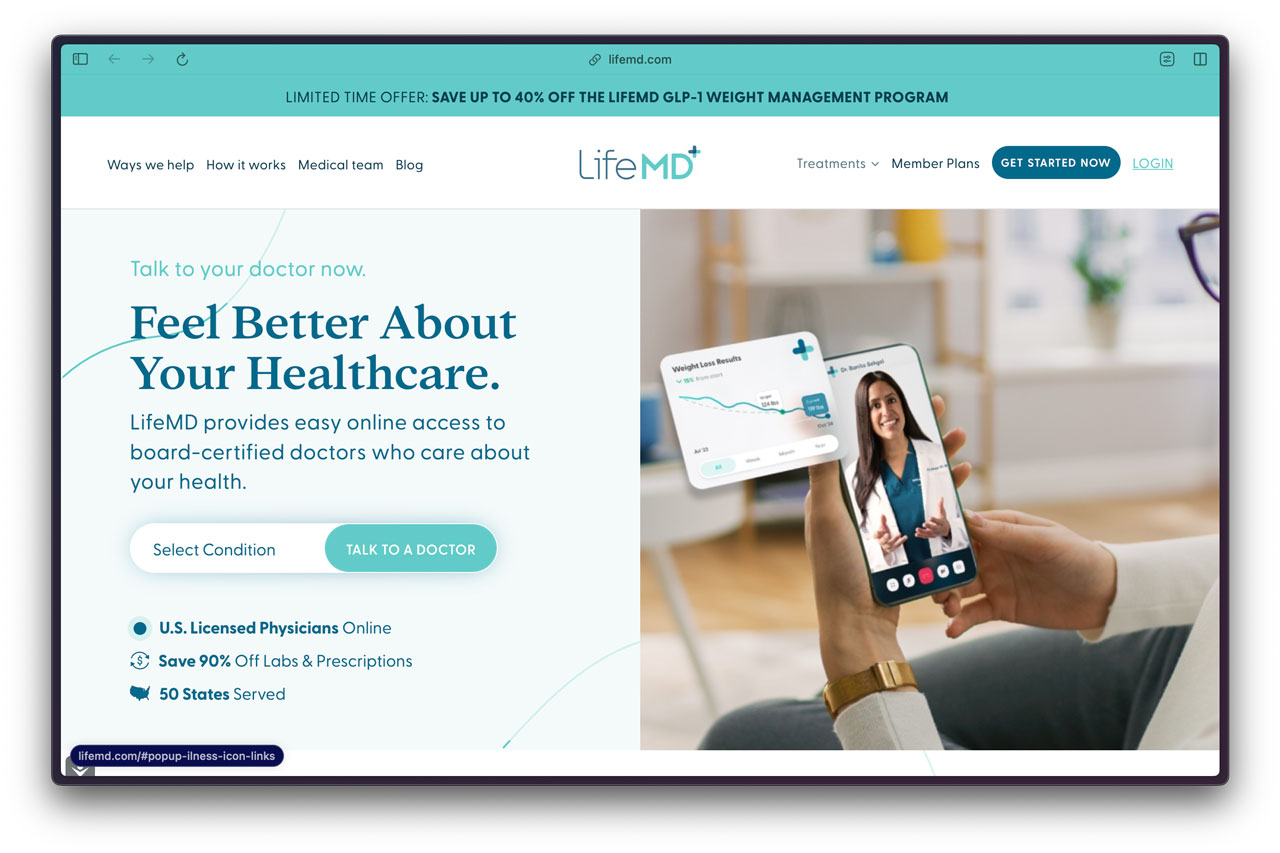
LifeMD
LifeMD was established in June 2010 by Co-Founder and CEO Justin Schreiber. LifeMD offers a personalized program that offers medications and expert guidance to help customers lose weight and keep it off by tracking goals via an app. The LifeMD program includes access to such weight loss medications as Wegovy or Ozempic.
LifeMD Inc.
236 Fifth Ave. #400
New York, NY 10001
Program Cost
LifeMD charges $129 monthly for its practitioner matching and prescription services, billed quarterly. The company offers a 50% discount on the first three months.
Reviews
Better Business Bureau lists nine negative reviews, many of them referring to an inability to cancel the service due to an “account details page [that] does not offer cancellation options,” In other words, the company uses “dark patterns.” Interestingly, the company site BBB links to is Nava MD.
LifeMD’s Trustpilot rating is 4.4 out of five, based on 68 reviews.

Noom
Noom was founded in 2008 by Co-Founder and President Artem Petakov and Saeju Jeong. Noom offers an app that helps people track their eating and exercise habits. In June 2023, the company announced a new program Noom Med that offers prescriptions through a new telehealth platform. Noom Med is available to people with a BMI of 30 or higher or greater than or equal to 27 for those with a weight-related medical condition. Noom Med users first undergo lab work and a health evaluation by a physician or nurse practitioner. The results allow clinicians to create a care plan specific to user health goals.
As with any of these services, expect you and your “accountability buddy” to be inundated with emails. We received 12 emails in five days.
Noom Inc.
450 W. 33rd St. 11th Fl.
New York, NY 10001
Program Cost
Noom Med costs $49 per month and includes “interactive patient education, a psychologically-aware curriculum, and a suite of comprehensive nutrition and exercise tools.” That is on top of the $42 per month customers will have to pay for Noom Weight, the company’s program that offers psychological tips to help with weight loss.
Reviews
Noom has been accredited by the Better Business Bureau as of Oct. 19, 2021. Still, the company only has a 1.3 out of five rating, based on 475 customer reviews. Unlike many other health outfits, Noom actually has to respond to BBB complaints. BBB says the company has received “1,368 complaints closed in last 3 years.” BBB adds “Please be advised that due to the high volume of complaints received for this business, BBB publishes 1 out of every 5 complaints handled through our conciliation process.” That means that the total number of complaints far exceeds the 1,368 figure mentioned. Example complaint, “In April 2022, they charged my card…$161.10…a full year after I had canceled my subscription.”
Noom’s Trustpilot rating is 4.1, based on 62,576 reviews.

PlushCare
PlushCare was founded in 2015 by Co-Founder and CEO Ryan McQuaid. PlushCare offers a medically guided weight management program that offers online prescriptions for Ozempic, which consists of three steps. Step 1 is booking a visit with a doctor to discuss Ozempic. Step 2 involves discussing treatment options with the chosen provider and completing a medical evaluation and lab work. The final step requires picking up medication from a pre-selected pharmacy, if prescribed.
The PlushCare site lists these Ozempic qualifications, “Patients with abnormal blood glucose, patients with prediabetes or metabolic syndrome, or in overweight patients (BMI > 27) with at least one-weight related condition, such as type 2 diabetes or high blood pressure, as well as obese patients (BMI > 30).
PlushCare Inc.
101 Mission St. #800
San Francisco, CA 94105
Program Cost
PlushCare says it accepts insurance plans from Aetna, Humana and United Healthcare. Most patients with in-network insurance pay $30 or less. Membership is $14.99/mo. plus copay for all visits. Those who pay without insurance are charged the same $14.99 monthly membership fee plus $129 for new patient visits, and $99 for follow-up visits. Footnote: *If we cannot help you or provide care, we’ll offer a full refund (see “Reviews” regarding refunds.)
Reviews
On the Better Business Bureau site, PlushCare has garnered a 1.24 out of 5 rating, based on 172 customer complaints. Here’s one representative Better Business Bureau complaint, “Once they have your money, they do NOT care. I have waited over a week for them to send a prior authorization to my insurance for a medication. I have emailed and called for days and I cannot get anyone on the phone or to respond to my emails.”
PlushCare’s Trustpilot rating is 3.4, based on 1,612 reviews.
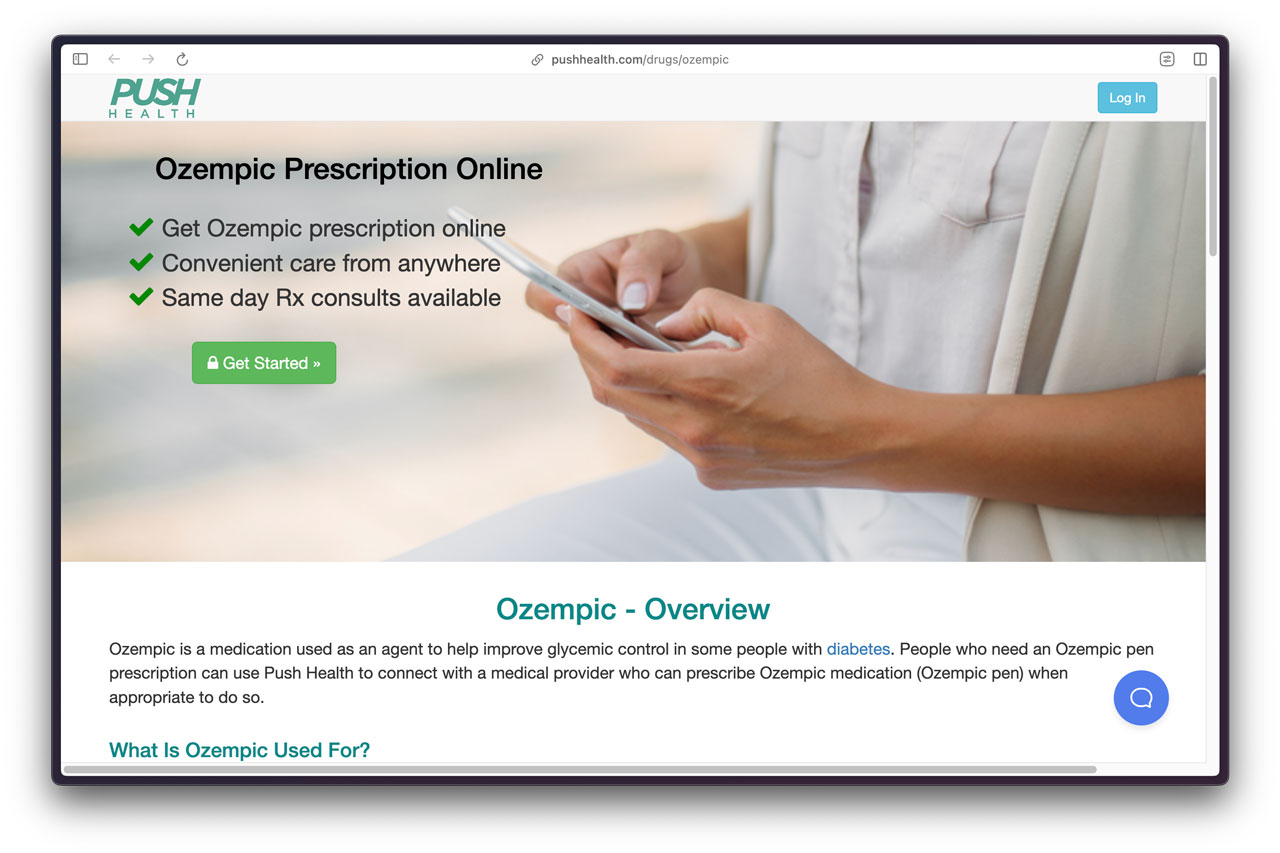
Push Health
Push Health was founded in 2012 by Chirag Shah and Matthew Williamson. Push Health bills itself as “matchmaking service” that charges no subscription fees. Out of all the sites listed here, Push Health has the most dated looking site. Could it be that El Segundo doesn’t have the same type of aesthetic values as New York or San Francisco? After clicking the “Get Started” button, visitors are asked to fill in a questionnaire. Once finished entering your data, the company surprises visitors with an upfront request for $64.99. We don’t like this non-transparent approach. On the other hand, Push Health is the only service reviewed here that does not charge a monthly subscription fee.
Push Health Inc.
1730 E. Holly Ave.
El Segundo, CA 90245
Program Cost
Push Health displays this notice after completing their website questionnaire:
”Thank you for submitting your request. We are pre-authorizing payment. The pre-authorization will show as a pending charge that will only settle if a medical provider provides a consultation and care recommendation. Your payment information is not saved after you click Submit.
Total Fees: $64.99.”
— Push Health website
Retrieved 21-Mar-23
Reviews
On the Better Business Bureau site, Push Health has received no rating, despite about 110 complaints. The most recent complaints, which chiefly involve not receiving a prescription from the user’s chosen pharmacy, appear to have been resolved by the company.
Push Health’s Trustpilot rating is 3.3, based on 484 reviews.
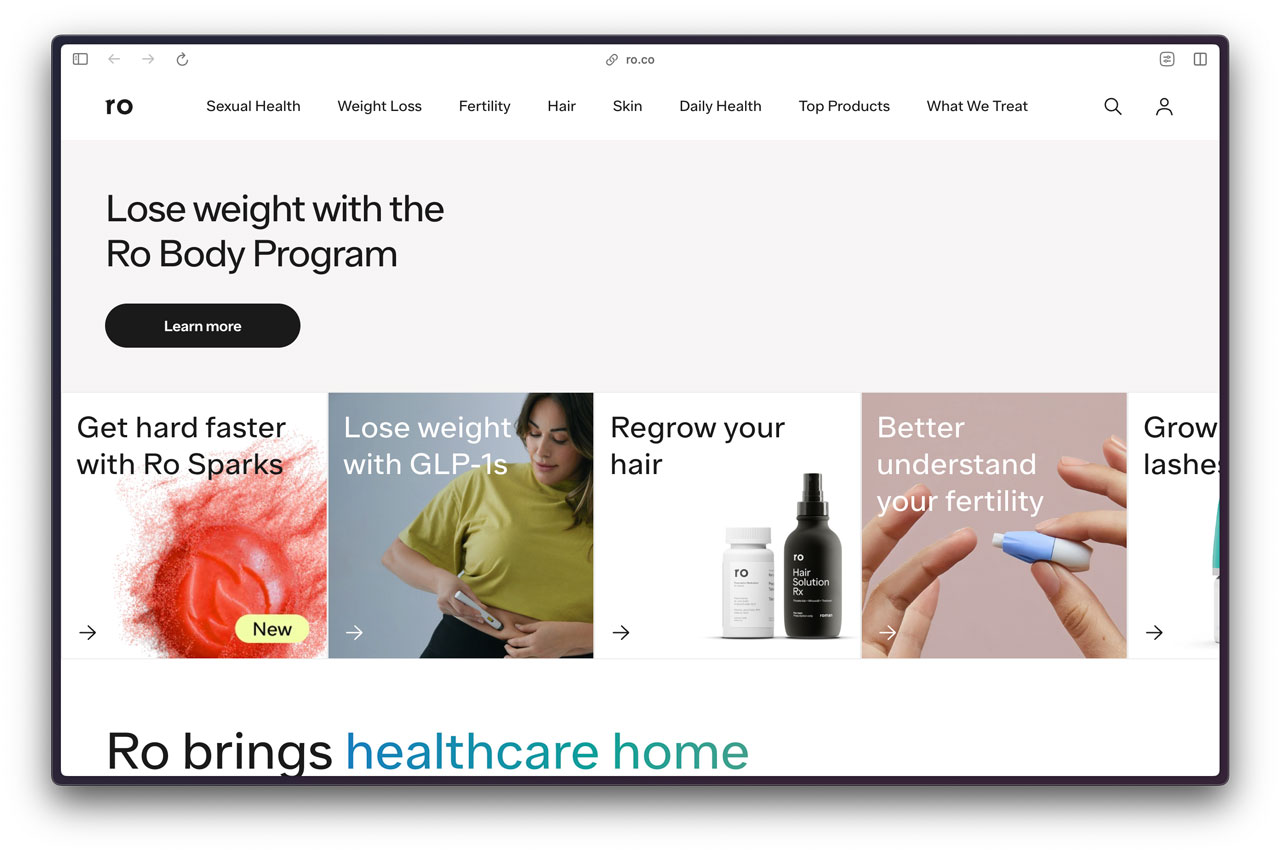
Ro
Roman Health was co-founded by CEO Zachariah Reitano, Saman Rahmanian and Rob Schutz in October 2017. The company was originally established as a cloud pharmacy for erectile dysfunction treatments. In 2018, the company dropped the “man” portion of its brand to become “Ro.” Ro offers a resource page dedicated to Wegovy, which you may find helpful.
Roman Health Ventures Inc.
116 W. 23rd St. 4th Fl.
New York, NY 10011
Program Cost
Ro’s Body Program costs $99 for the first month and $145 for subsequent months. Prescriptions are, as usual, not included in these monthly subscription fees.
Reviews
The Roman Health Ventures Better Business Bureau (BBB) profile has an average review score of 1.69 out of 5 stars based on 13 reviews. Positive reviews claim Ro’s services can benefit people looking to buy test kits unavailable at local stores. Negative reviews mention shipping problems. The company was responsive to BBB complaints early on but has failed to respond to customers since 2021.
Ro’s Trustpilot rating is 1.6, based on 83 reviews.
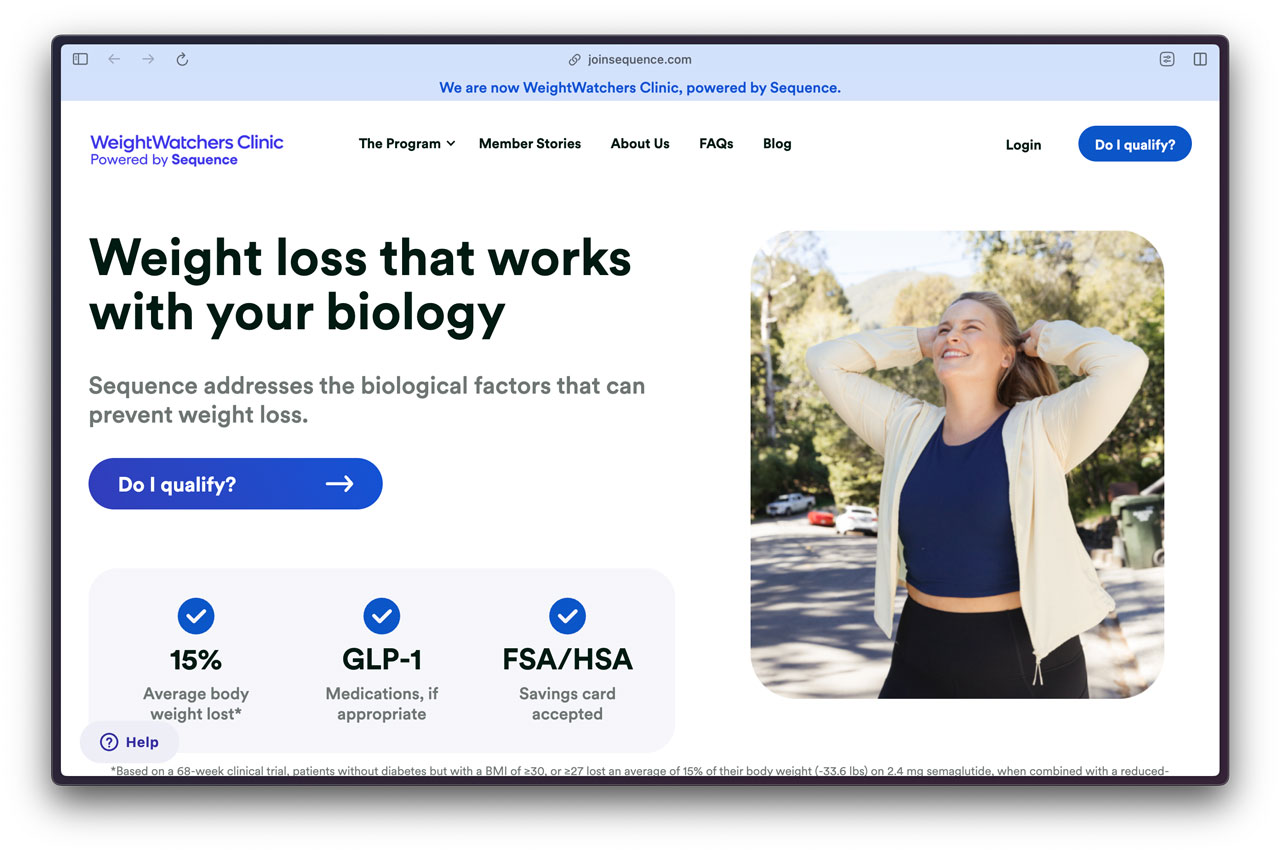
Sequence
Sequence was established in 2021 by Co-Founder and CEO Rémi Cossart. In March 2023, WeightWatchers announced the acquisition of Weekend Health Inc., which does business as Sequence. This subscription telehealth platform offers access to healthcare providers specializing in chronic weight management. According to the company, Sequence has an annual run rate of about $25 million and serves approximately 24,000 members across the U.S. as of February 2023.
Weekend Health Inc. dba Sequence
870 York St.
San Francisco, CA 94110
Program Cost
Sequence charges $49 for an initial consultation, due at the time of checkout. After that, membership for the program costs $99 per month. The Sequence program includes follow-up appointments, access to a dietitian, fitness coaching, a companion app, weight loss lessons, and an “insurance advocate.”
Reviews
Neither Sequence or Weekend Health has a Better Business Bureau (BBB) profile. Sequence’s Trustpilot rating is similarly 0.0, based on zero reviews.
This field is clearly growing fast, and with a market where nearly one in three adults (31%) are overweight, and more than two in five adults (42%) are obese, it seems that the startups featured here would enjoy streets paved with gold. However, it’s clear that most of these companies have a lot of growing up to do, and need to vastly improve customer experience to deal with the probably unreasonable expectations of many of their customers. 😍
Test Results
We have been testing the semaglutide drug Ozempic. Our testers include the first participant, Tester 1, a female Las Vegas resident in her 50s, who purchased Ozempic without insurance for $772.05 at Walgreens using a SingleCare Pharmacy Savings Card. Tester 2, a male also in his 50s, received a SingleCare discounted price of $814.55 for the six-dose starter kit.
After researching options, we chose Push Health which assigned a nurse practitioner based in Florida to write our prescriptions. The company charges a $65 virtual consultation fee for three months worth of prescriptions. To renew a prescription requires another payment of $65.
Tester 1 started her therapy on July 24 with four doses of 0.25 mg and two injections of 0.5 mg as prescribed in the first prescription. The following day, her weight was unchanged at 142.2 pounds. The table below shows her weight on the 25th of each month for six months, with the exception of Christmas day when she weighed herself on the 24th:
| Date | Weight (Lbs.) |
| 07/25/2023 | 142.2 |
| 08/25/2023 | 132.4 |
| 09/25/2023 | 129.2 |
| 10/25/2023 | 127.1 |
| 11/25/2023 | 126.9 |
| 12/24/2023 | 124.6 |
| 01/25/2024 | 121.0 |
Over a six-month period of taking Ozempic almost weekly, with the exception of October, when Tester 1 took four weekly semaglutide doses supplied by a compounding pharmacy.
Due to switching back to Ozempic and traveling to New York in November, no dosing took place during this month.
Tester 1’s initial impression was that Ozempic was “very strong” and “food didn’t appeal” to her. She loved the fact that it reduced the urge to eat. But after a while, the urge returned, and she had to fight it off.
After researching various options, we chose Push Health which assigned a nurse practitioner based in Florida to write our prescriptions. The company charges a $65 virtual consultation fee for a three-month supply of semaglutide.
Tester 1’s SingleCare savings amounts vary. Tester 2’s report will be filed in approximately four weeks. In addition, she has been following a relatively strict diet and going to the gym regularly.
The male tester 2 abandoned the Ozempic test after six weeks due to the nauseating feeling that accompanied taking the drug. Tester 2 lost 12 pounds during a two-month period:
| Date | Weight |
| 08/25/23 | 189.6 |
| 09/03/23 | 183.4 |
| 09/29/23 | 181.0 |
| 10/31/23 | 177.5 |
| 11/05/23 | 177.6 |
